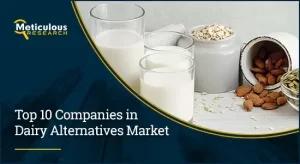Currently, there is a significant increase in the demand for protein. The human body utilizes proteins from various food sources to create specialized protein molecules that contribute to the production of hemoglobin (Hb), a critical blood component that transports oxygen to all parts of the body and promotes healthy metabolism. Additionally, there is a rising demand for dietary supplements driven by growing awareness of weight management across all age groups worldwide. These supplements provide essential nutrients, supporting a healthier lifestyle.
Download free sample report here: https://www.meticulousresearch.com/download-sample-report/cp_id=5121
Collagen, found naturally in animals, particularly in the flesh and connective tissues of mammals, plays a crucial role in maintaining the firmness, suppleness, and constant renewal of skin cells. It is essential for skin elasticity. However, collagen synthesis in the body diminishes with age, leading to weakness, fatigue, pain, and reduced energy levels, thereby creating a need for external collagen supplementation. This demand has given rise to the collagen supplement industry. Collagen supplements are designed to support the health of skin, hair, nails, and body tissues by aiding in the synthesis of new collagen through the attraction of fibroblasts. In food, collagen is primarily found in tougher cuts of beef containing connective tissue. Collagen constitutes about 25-35% of the total protein content in mammals, making it a vital protein.
Collagen and gelatin are extensively used in dietary supplements, functional foods, beverages, confectionery, and desserts. As food additives, they enhance the organoleptic properties of various products. For example, adding collagen to sausages and frankfurters improves their rheological properties and introduces animal nutritive fibers. Desserts, often considered sugary indulgences with limited health benefits, gain nutritional value from collagen in powdered form, which provides essential proteins and amino acids that promote collagen and elastin production, resulting in healthier skin, reduced inflammation, and improved hair growth. Collagen and gelatin are also present in confections such as marshmallows, gummy bears, fruit snacks, jelly babies, and other similar products.
Despite the recent economic slowdown, the global confectionery market continues to grow, driven by a rising population and the affordability of these products. In the beverage industry, collagen enhances the body’s natural ability to generate fatty tissues. Collagen drinks are believed to stimulate the body’s collagen production, reducing skin wrinkles and sagging. In Malaysia, companies like Malaysia Dairy Industries (MDI) are conducting R&D on collagen beverages. Their probiotic drink, ‘Vitagen Collagen,’ contains collagen peptides and vitamin C to stimulate collagen synthesis, promote gut health, and improve skin radiance. Collagen is also used in some alcoholic beverages as a clarifying agent by aggregating yeast and other particles, improving clarity. Similarly, bovine collagen in solution form is used in beer refining, while gelatin serves as a clarifying agent in winemaking and fruit juices.
Browse in depth: https://www.meticulousresearch.com/product/collagen-market-5121
The application of collagen in meat and fish products is expected to rise due to the growing production of processed meat and the increasing global population. According to the Worldwatch Institute’s Nourishing the Planet Project, global meat production has tripled over the last four decades and grown by 20% in the last decade. Developed countries consume nearly double the amount of meat compared to developing countries, suggesting a rising demand for collagen in this sector.
The dairy industry is another significant area for collagen use. The Food and Agriculture Organization (FAO) reported a global milk output of 843 million tons in 2018, a 2.2% increase from 2017, driven by expansions in India, Turkey, the European Union, Pakistan, the U.S., and Argentina. This growth offers a substantial raw material base for milk-based processed products. The need for dairy products that are easy to prepare, stable, low in calories, and have unique textures and flavors has prompted dairy processors to incorporate gelatin.
Download request sample report here: https://www.meticulousresearch.com/request-sample-report/cp_id=5121
Gelatin improves the texture and stability of various dairy products, including yogurts, cream desserts, mousses, and low-fat cheeses, and serves as a fat substitute in low-fat milk and yogurt. It also enhances ice cream’s stability, preventing ice crystal formation and improving its texture and melting characteristics. In cheese, spreads, margarine, and low-fat butter, gelatin enhances stability and shelf life and improves the mouthfeel of low-fat milk-based products. The increasing consumption of dairy products, driven by population growth, improved milking technologies, and efficient farm management, is expected to boost gelatin use in the dairy sector in the coming years.
Consequently, the demand for collagen and gelatin in the food industry is projected to grow significantly in the coming years. Over the past decade, there has been a substantial increase in the demand for processed foods, particularly bakery and confectionery products.
Buy now: https://www.meticulousresearch.com/Checkout/63172835
The increasing awareness of protein consumption and dietary supplements is driving the collagen market within the food and beverage sector. These factors are anticipated to support the growth of the collagen market, which is expected to register a compound annual growth rate (CAGR) of 6.9% and reach $8.64 billion by 2029, according to Meticulous Research®.
Contact Us:
Meticulous Research®
Email- [email protected]
Contact Sales- +1-646-781-8004
Connect with us on LinkedIn- https://www.linkedin.com/company/meticulous-research
Additional resources
- Jeux Casino En Ligne
- Meilleur Casino En Ligne
- Meilleur Casino En Ligne
- Meilleur Casino En Ligne
- Sites De Paris Sportifs En Belgique
- Site Paris Sportif Belgique
- Paris Sportifs Belgique
- Meilleur Casino En Ligne Belgique
- Meilleur Site Casino En Ligne Belgique
- Migliori Casino Online
- Casino Online App
- Siti Scommesse Bitcoin
- Site De Paris Sportif Bonus
- Sweet Bonanza Avis
- Ufc Paris Sportif
- オンカジ 出金 早い
- 本人確認不要 カジノ
- онлайн казино зарубежные
- Nhà Cái đến Từ Châu âu
- Site Paris Sportif Retrait Instantané
- Site De Paris Sportifs
- Nouveau Casino En Ligne Francais
- Casino En Ligne
- Nouveau Casino En Ligne Fiable
- Casino En Ligne 2026
- Casino Senza Richiesta Documenti
- Casino En Ligne Qui Paye Vraiment
- Casino En Ligne Fiable
- Casino Bitcoin
- Casino Italiani Non Aams
- Migliori Casino Online Italia
- Siti Non Aams Sicuri
- Casino Non Aams
- Meilleur Site De Casino En Ligne Belgique
- オンラインカジノ
- Meilleur Casino En Ligne France
- Casino En Ligne France
- Casino En Ligne Qui Paye Rapidement
- Casino En Ligne 2026
- Casino En Ligne







